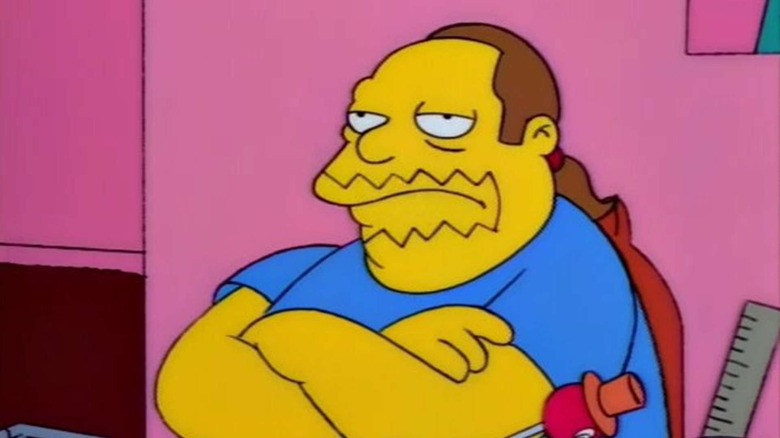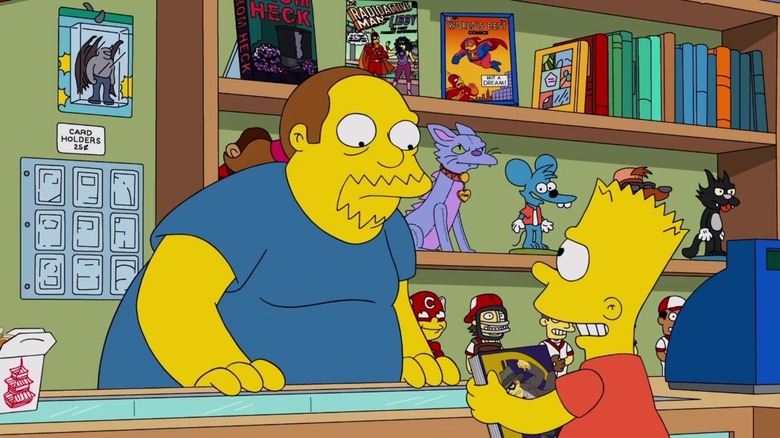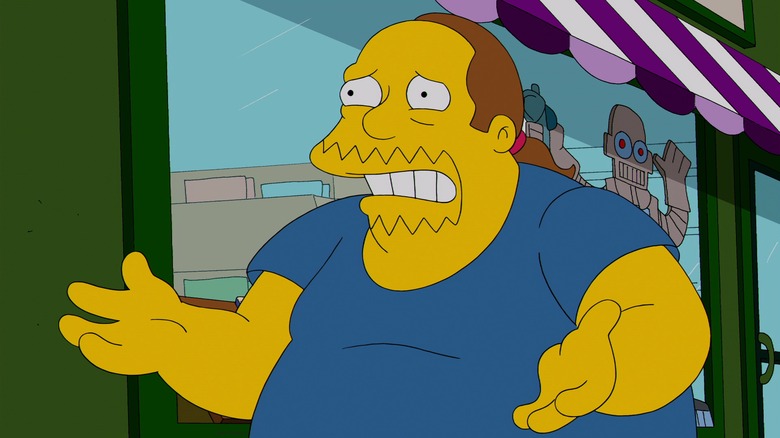The Hate-Filled Simpsons 'Fan' Website That Inspired Comic Book Guy
The smug, arrogant Comic Book Guy (Hank Azaria), proprietor of the Android's Dungeon, first appeared in the "The Simpsons" episode "Three Men and a Comic Book" (May 9, 1991). In the episode, he sold a rare and expensive copy of "Radioactive Man" #1 to the young collectors Bart (Nancy Cartwright), Milhouse (Pamela Hayden), and Martin (Russi Taylor). The comic cost $100 — a fortune to the three young boys — and they had to pool their money to make the sacred purchase.
The trio, however, never decided who would serve as the comic book's official caretaker, and they immediately became suspicious that one of them was angling to steal it from the other two. A "Treasure of the Sierra Madre" drama slowly unfolds. The Comic Book Guy, having seen the boys' folly beforehand, became a Mephistophelean figure, cackling at his customers' hubris.
In every one of Comic Book Guy's subsequent appearances, he would be grumpy, aloof, and pompous, lording his comic book knowledge over others, and mocking them if they asked questions. He was the very model of toxic fandom, eager to gatekeep and belittle those who didn't pass his tests of nerdery. Anyone who has regularly visited comic book shops has likely encountered their own Comic Book Guy and will recognize his unique flavor of supercilious priggishness.
It is explained in the "Simpsons" history book "Springfield Confidential" by Mike Reiss and Mathew Klickstein, that Comic Book Guy (real name: Jeff Albertson) was only partially inspired by the common bloviating nerd one might encounter in real life. More specifically, Comic Book Guy was inspired by the webmaster of a hate-filled "Simpsons" "fan"-site called NoHomers.net. The phrase "Worst. Episode. Ever." came from that unnamed, hateful man.
Worst. Fan Website. Ever.
Reiss noted that whoever was writing for NoHomers.net was one of those "fans" who seemed to hate the object of their affection. Many of such fans long for a very specific time in the life of an entertainment franchise, and feel that it "hasn't been good since episode #[blank]." You can see the descendants of these angry nerds on present-day YouTube, hosting videos with titles like "MARVELS WORST EVER" or "DISNEY KEEPS FAILING." It's the same pathetic nerd onanism from the '90s repackaged. The NoHomers webmaster, Reiss said, would log in mere minutes after every new "Simpsons" episode aired on Sunday nights to declare it the worst episode yet. The "Worst Episode Ever" sentiment even began to precede actual broadcasts; Reiss recalled seeing a post that read "I just saw the promo for next Sunday's Simpsons, and it clearly will be the Worst Episode Ever."
Reiss admitted that most of the writers of "The Simpsons" couldn't stomach reading such websites. Such sites rarely offer constructive criticism, and their suggestions for how to improve the show are usually based on wildly incorrect interpretations. Executive Producer Al Jean, however, would indeed comb through such websites, hoping to find a general consensus on the show and perhaps glean some kind of legitimate criticism through an amalgam of comments. Jean, Reiss wrote, found plenty of messages in such forums calling for the producer's death. One can only imagine Jean's constitution in reading repeatedly that he should "die in a car crash" and retain his sanity.
But, according to Reiss, "sometimes the fans get it right." When Homer is written to be too mean, for instance, fans hated it. The "Simpsons" writers listened to that particular note and made Homer less cruel.
Cut me some slack
So the "Simpsons" writers are open-minded and willing to take notes, but they know that the fans will be angry regardless. Reiss wrote that "[S]ometimes [fans] should cut us some slack. One fan complained, 'In Season 8, Homer smuggled beer. Then in Season 27, he smuggled snakes. Rip-off.'" Two similar stories 19 seasons apart aren't so grievous a crime. Reiss also noted that the critic writing that comment was only 14 years old.
"The Simpsons" is so long-lived, that it's bound to repeat story or character beats occasionally, but the writing staff has remained remarkably sharp in its 34-year run. The criticism that "The Simpsons" "hasn't been funny since season [blank]" has hounded the show for the bulk of its tenure. Perhaps the series has had high points and low points, and its viewership has been slowly falling over the last 20 years, but "The Simpsons" remains robustly successful.
The more salient criticisms of "The Simpsons" likely come from the fact that it has outgrown its own politics. A 2021 article in Salon, written by Keith A. Spencer, pointed out that "it came of age in a political moment that no longer exists." The show's writers, Spencer points out, grew up in the '50s and '60s. Show creator Matt Groening's artistic breakthrough, the underground comic "Life in Hell," was a bitter strip about Reagan-era America. "The Simpsons" was born out of '80s bitterness, an animated take-down of "wholesome" Conservative values that obviously had no value.
By 2024, economics and politics had changed so much that no one under 40 would recognize what "The Simpsons" was initially criticizing. The show's politics have become old-fashioned. It was once bitter and puckish in its view of American values. Like its aging staff, "The Simpsons" may merely be lost in the present.


